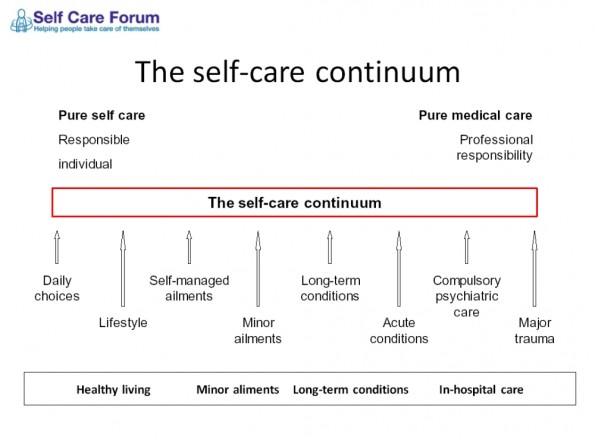
Self-care is all the rage right now, and not before time. In our busy, digitised, stressful ‘lives’, we seldom take time to look after number one – physically, emotionally or mentally – and we are finally, belatedly beginning to realise this.
We don’t get enough sleep, most of us eat poorly (certainly less-than-optimally) and exercise is often limited to reaching for the TV remote or flipping open our laptops.
Although the balance will be different for different people, we all need creativity, physical activity and mindfulness to work symbiotically to nourishes us personally: to comforts us, keeps us calm and to make us happy.
What is self-care?
According to Self Care Forum, it’s defined as “the actions that individuals take for themselves, on behalf of and with others in order to develop, protect, maintain and improve their health, wellbeing or wellness.”

Image: selfcareforum.org
Why is self-care important?
It’s beneficial for our physical and mental health – for instance, exercise triggers the release of endorphins which offer mind-boosting benefits. It can also positively impact our emotional wellness – decluttering can lift mood, being compassionate to yourself can boost self-esteem. Spoiler alert! Doing things which make us feel good actually makes us feel good – who knew?!
 Prioritising self-care – doing something just for ourselves– is a reminder that we do matter, however negative our thoughts might be, however down and stressed we might be feeling. The more we practice self-care, the more our sense of self-worth will improve.
Prioritising self-care – doing something just for ourselves– is a reminder that we do matter, however negative our thoughts might be, however down and stressed we might be feeling. The more we practice self-care, the more our sense of self-worth will improve.
But perhaps most importantly, self-care empowers us – although we all have the need for medical or therapeutic help on occasion, doing what we can for ourselves boosts self-confidence and shows us we are in charge. Self-care is accessible to everyone and the smallest steps can make a big difference.
“If your compassion does not include yourself, it is incomplete.”
– Jack Kornfield
Three simple steps to self-care
Social media updates, incessant emails, the ‘ping’ of the latest (bad) news update. We’re inundated daily, hourly even, by the vibrating of our phones, or the pop-ups on our computers.
Do yourself a HUGE favour: go through the people on your Twitter feed and only keep those who genuinely interest you. On Facebook, mute or unfollow the ‘friends’ and accounts which make you feel below par or unhappy with yourself. Social media should be fun and should make you smile and feel positive, not substandard and worthless.
Go through your email inbox and unsubscribe from any emails you don’t remember signing up for, or ones you’re really not interested in. Set rules for incoming emails so they go directly into certain folders, lightening your inbox and removing the feelings of overwhelm as 50 new emails suddenly arrive for your attention.
While you’re at it, revisit the notifications on your phone and switch off those which really aren’t vitally important. That little red dot is highly stressful for many of us and demands immediate attention – it really doesn’t!
Turning it off so we need to physically go into apps for updates and notifications means we can focus better on what we are doing in the moment (work, study, friends or family, resting or sleeping), reducing anxiety and stress, and giving us some ‘me’ time.
- Create a bedtime routine
Sleep is vital to our physical, mental and emotional wellbeing, and yet, few of us get enough sleep, nor enough quality sleep. Regular poor sleep puts you at risk of serious medical conditions and shortens your life expectancy.
Here are some simple steps for better sleep:
- Turn off your phone and other screens at least an hour before bedtime – the blue light from screens adversely affects our circadian rhythms
- Try and go to bed at the same time every night
- Have a warm drink (non-caffeinated!) before bed to relax the body e.g. warm milk
- Use soothing, classical music to help you unwind
Make sure your bed is as comfortable as it can be – wash and change your bedding regularly and flip the mattress when you do it (or at least every month); keep your pillows in good shape; is it time for a new mattress or new pillows? How is your sleep position affecting you?
Creating a bedtime and doing a sleep audit is a simple but hugely effective act of self-care – try it tonight.
- Don’t say ‘yes’ when you want to say ‘no’
Doing things for others, while in itself an act of kindness, is a gift from you to them, often at your own expense in terms of time and energy. We subconsciously look for the approval of others and often find ourselves agreeing to do things we really don’t want to.
Stop. Now.
You are important and your needs should take priority. Make sure that in saying ‘yes’ to someone else, you are not saying ‘no’ to yourself. Consider how you feel – if you feel taken advantage of or resentful, you’ve passed your boundaries and have become bogged down by the weight of others’ expectations. Not good for self-care.
Little by little
It can be pretty daunting realising you need to put yourself first from time to time. Many of us find it easier to look out for others before considering our own needs. But by implementing simple changes, perhaps one a day over a period of time, we can begin to see real improvement in our own health and wellbeing.
Tiny Buddha is an excellent resource, offering reflections on simple wisdom and new ways to apply it to our complex lives. There are posts about happiness, love, relationships, change, meaning, mindfulness, spirituality, simplicity, minimalism, letting go, and much more, including self-care practices for a healthy mind, body and soul.
“When the well’s dry, we know the worth of water.”
– Benjamin Franklin

